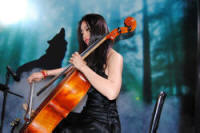Pro-forms
 |
standing in for |
Pro-forms can, quite arguably, be considered a word class in their
own right. A pro-form is a word or phrase which depends for
its meaning on reference to something else for which it stands.
For example
I did that
means very little if we don't know what
that refers to.
(In what follows, pro-forms
(or references) being discussed are in
black and their
referents, i.e.,
what they stand in for, are in red.)
Here's an example of the phenomenon at work:

and here we have the pro-form do so standing in for the clause get all the work we had asked him to do on the new house finished.
We can actually stop the sentence after didn't with no loss in meaning. That's ellipsis of an understood clause and we are not overly concerned with it here. The guide to substitution and ellipsis, linked in the list of related guides at the end, covers ellipsis in more detail.
Without using pro-forms in language, it is almost impossible to produce natural, cohesive texts, either written or spoken, so they repay a certain amount of classroom attention.
 |
Pro-form vs. pronoun vs. prop form |
Pronouns as pro-forms
The concept of a pronoun (i.e., stand-in for a noun) is familiar in,
e.g.:
I saw John
but he
didn't see me
And we can also encounter something like:
- I saw the man in the red jacket that my wife had told me about and went up to him
in which the pro-form him (a pronoun here) stands in for the complex noun clause the man in the red jacket that my wife had told me about.
However, pro-forms do a lot more than simply stand in for nouns. They also help us to avoid repeating whole clauses and phrases. For example:
- I offered him some tea and biscuits with a bit of cake but he didn't want any.
- I offered him some tea and biscuits with a bit of cake although I knew he wouldn't want any.
Sentence 2 is a compound sentence with two potentially
stand-alone clauses. Sentence 3 is a complex sentence with a
subordinate and dependent clause which can't stand alone.
In both cases, connecting clauses in this way to form more complex
and fluent language is made much easier by the use of the pro-form
any, a pronoun in this example. Try making the
sentences without using the pro-forms to see what's meant and you
get the horribly clumsy:
I offered him some tea and biscuits with a bit of cake but he
didn't want any tea or biscuits or a bit of cake.
Other pro-forms
Later in this guide, we shall see how pro-forms work as substitutes for other elements of the syntax. Briefly, for example, we can use pro-forms for:
- Verb phrases (with or without their object phrases) as in:
She asked John to cook (dinner) that evening and he said he would do so.
They took the train to London as I did to Margate - The entire predicate of a clause as in:
They lost a lot of money in the 80s and so did John
She couldn't see the sense of the changes and neither could I - Adverbials as in:
I put it in the corner and left it there
She drove quickly and got there on time that way
Prop-forms
English grammar often requires a noun or pronoun in order for the
syntax to be acceptable so, for example, while it is possible to
have:
I bought the red tie because I didn't like the blue
the sentence is slightly ambiguous (Is it the colour or the tie that
was disapproved?) and unusual.
In English, we often insert what is called a prop form to ensure
grammatical consistency so we have:
I bought the red tie because I didn't like the blue
one
Other examples are:
Pass me that
one
She bought the green one
It's
raining
I like the ones
on the shelf over there
Take from those ones
etc. and, as we see, the pronoun one/ones is a very common
prop form in English.
The existential use of there
and the non-referential use of it as in, e.g.:
There
is a new car in the car park
It is
raining
are also sometimes referred to as prop forms although in something
like:
It was nice to see it
the word it is not a prop-form but a pronoun
substituting for the non-finite clause to see it so the
sentence can be rephrased as
To see it was nice.
There is a little more on the anticipatory uses of it
and there in the guide, linked below.
In summary, the difference is that a pro-form substitutes directly for a noun phrase but a prop-form is just a way to make a clause unambiguous and grammatical. This is not a distinction that should trouble learners but teachers do need to know what they are dealing with.
Other languages, incidentally, do not suffer from this constraint
and are more happy to use determiners or adjectives as pronouns or
nouns in their own right. For example, speakers of many
languages (including German, Dutch, Scandinavian languages, Slavic
languages, Romance languages, Arabic, Greek and more) will
translate:
I took the blue one
as
I took the blue.
 |
Pro-forms for nouns |
It seems simple enough that the pro-form for nouns will be a pronoun. However, there are limitations on the use of pronouns standing for nouns. For example:
- Peter read the book and saw the film.
- Peter read the book and now he has seen the film
In sentence 4. we have an example of ellipsis. It is unnecessary to repeat Peter or to insert a pronoun to stand for him because it is clear that the subject of both verbs is the same and the verbs are in the same, past simple, tense.
In sentence 5, because we have an auxiliary verb making up
the perfect aspect (has), the subject, or its referencing pronoun, cannot
usually be omitted. We
can't have:
*Peter read the book and now seen the film
because the first verb is in the simple aspect and the second
in the perfect aspect, so the pronoun (usually) and the auxiliary
(always) must be inserted.
If both verbs are in the same aspect, it is possible to omit
the pronoun, as we saw with sentence 4. so we allow:
Peter has read the book and seen the film.
with both verbs in the perfect aspect.
When we use modal auxiliary verbs, the situation becomes slightly more complex. For example:
- Fred can't have just walked in and stolen the money
- Fred can't have just walked in and he can't have stolen the money
- Fred can't have just walked in and have stolen the money
- *Fred can't have just walked in and he have stolen the money
- *Fred can't have just walked and he stolen the money
In sentence 6., we have a case of ellipsis with the phrase he
can't have omitted altogether. No pro-form is required.
In sentence 7., we have a rather clumsy and unnatural result of
repeating the subject with a pro-form (he) and then
repeating the modal auxiliary verb and the primary auxiliary verb
making the past tense (not, incidentally, in this case a perfect
aspect).
In sentence 8., we have another clumsy but possible sentence with
ellipsis of the modal auxiliary verb and its negator (can't), leaving the primary
auxiliary in place.
However, sentences 9. and 10. are unacceptable.
If we omit the modal auxiliary verb (can't, in sentences 9
and 10) we cannot use the pro-form at all. We also can't
repeat the subject. We have to ellipt the subject altogether
(as in sentences 6. and 8.) or insert the pronoun with the modal
auxiliary verb as in sentence 7.
The use of subject-case pronouns and object-case pronouns is covered
in the general guide to pronouns in English, linked below.
A number of other pro-forms can stand for noun phrases. That doesn't mean they are all pronouns, although they often are:
- each, none, either, neither, all
- The guests complained to the manager and each had a point.
-
The guests
complained to the manager but
none was
satisfied.
Give me the pen or the pencil. Either will do.
I tried cleaning it with soap and with petrol. Neither worked.
The hotel refunded the costs to the guests. All were happy with that.
or
The hotel refunded part of the costs to the guests. None was completely happy with that
What the pro-form that stands for in two of the examples is discussed below. - determiners and elliptical expressions: some, any, both, half, few, enough
- These appear to be the same as the last category but it's
usually possible to see them as cases where we can
omit of plus the noun or pronoun rather than replace it with a pro-form.
In this sense, the case is one of ellipsis rather than pro-form
substitution:
The guests complained.
Some (of them) came away happy
Few (of them) were satisfied
Half (of them) were satisfied
Enough (of them) were happy
Any (of them) were invited to write to the manager
Two guests complained and both (of them) got the same answer.
etc. - the same
- This is a common pro-form for noun phrases:
I'll have the chicken. I'll have the same.
The phrase can also be used to stand for a nominalised clause as in, e.g.:
I expected the train would be late and she expected the same
We shall see below how the same can also be a pro-form for a clause which is not nominalised.
- partitives
- These are forms of classifiers in English and can be
general, typical or restrictive. There is a guide to these
on this site linked below. All types can be used as
pro-forms as in, for example:
I loved the material so I bought lots
a general partitive pro-form standing for lots of the material
I loved the hand-made paper so I bought a sheet
a typical partitive for thin, flat substances standing for a sheet of the hand-made paper
I loved the bread so I bought a loaf
a restricted partitive for this substance only
All partitives can be used with an of-phrase but it is not necessary and sometimes clumsy:
I loved the material so I bought lots of it
etc. - demonstratives
- The demonstrative pronouns in English can, more formally, be
substitutes for noun phrases so we can have for example:
He wanted me to lend him the special tools. Those I could not find.
She gave me the book about Everest. That I have not yet read.
I am getting the £100 tomorrow but have £50 with me. This I can give you now.
I bought lots of roses at the garden centre. These I will plant out tomorrow.
There are two other pairs of quasi demonstratives that can do the same:- The former and the latter
These frequently function in tandem but are also found alone so we can accept, for example:
The children and their parents are all here. The former will get sandwiches and cakes. The latter will have something hot.
The children and their parents are all here. Only the former will get sandwiches and cakes.
The children and their parents are all here. Only the latter will have something hot. - The one and the other
These are always paired and rarely seen alone. We may encounter, e.g.:
You can have the beef or the pork. Choose the one or the other.
but there is a non-intuitive restriction in that the definite article may be ellipted from the one but not from the other. We allow, therefore:
You can have the beef or the pork. Choose one or the other.
but we cannot allow:
You can have the beef or the pork. *Choose one or other.
- The former and the latter
- genitive pronouns
- English has a defective genitive pronoun system. The
only pronouns available are mine, yours, hers, his, ours
and theirs. It is clear from that list that:
- there is no genitive pronoun at all for the pronoun
it. So, although we allow:
Which car needs servicing?
Ours.
we cannot allow something like:
Which engine needs servicing?
*Its. - The pronoun yours makes no distinction in terms of number or social relationships so is used for plural and singular and for close acquaintances and strangers or more high-status people equally.
- The pronoun his has the same form as the possessive determiner.
His grammar is better than mine
My car is similar to yours
Your letter came earlier than hers
Her opening speech was better received than his
Their house is larger than ours
Our hotel room in Margate was almost as expensive as theirs in London.
etc. - there is no genitive pronoun at all for the pronoun
it. So, although we allow:
- reciprocal pronouns
- There are only two reciprocal pronouns in English: each
other and one another. They both function as
neat short-cuts to avoid excessive use of noun phrases so,
instead of:
John played tennis against Peter and Peter played tennis against John
we can get to:
John and Peter played each other at tennis
and instead of:
The whole class talked to the whole class about the excursion
we get:
The whole class talked to one another about the excursion
Generally, one another is slightly more formal and less common. There are those who will insist that one another may only be used to represent more than two nouns but that is not a sustainable position although sentences such as
John and Mary were talking to one another
sound odd to many people.
Using each other is a safe bet in all circumstances.
 |
Pro-forms for verb phrases |
We saw, in the analysis of the same above that this pro-form may stand for a nominalised verb phrase and noted that it can also substitute a non-nominalised phrase. It is not alone.
Pro-forms replace verb phrases in a number of ways.
- so
-
One of the most common
substitutions is to use the pro-form so to stand for the
verb phrase and any modifying adverbials.
For example:- They should come to the restaurant and so should you.
- I was eating at the restaurant and so was she.
- He called the waiter and so did I.
The answer is that so plus the auxiliary verbs, whether primary, such as was, or modal, such as should, can stand for the whole clause.
In tense forms which have no auxiliary (confined, in English, to present and past simple forms), leaving out the clause requires the insertion of the operator do / does / did depending on person and tense.
That's quite a simple rule.
A single auxiliary verb, primary or modal, can stand for the whole clause, including any other auxiliaries as in, e.g.:
I should have been meeting my friends at the restaurant and so should she.
I have been doing yoga since I was six and so has my brother.
This pro-form requires a change in word ordering with inversion of subject and object or a lookalike question form with the do operator, so instead of the forbidden:
*He has been working here for year and so she has
*He worked here for years and so she did
we get:
He has been working here for years and so has she
He worked here for years and so did she - the same
- This pro-form can, as we saw, stand for a noun phrase or a
nominalised verb phrase acting as a noun as in, e.g.:
She wanted to see the sun shining and I wanted the same
However, the same, when it is used as a pro-form for a non-nominalised verb phrase and any adverbials requires the insertion of the operator do to stand for the verb so we have, for example:
They should work harder and you should do the same
In quite formal uses, the same can be made to stand alone for the verb phrase with no do operator as in, e.g.:
I'm taking the train to London and John the same.
More commonly, we use the operator do in this kind of substitution and produce, e.g.:
I came early and Mary did the same
She'll arrive late and John will do the same
I was shopping in town and Peter was doing the same
We may even add thing after the same to get, e.g.:
I was running to catch the train and she was doing the same thing. - do / does / did / done
- The do-operator can itself be a pro-form and stand for
the whole of a predicate. For example:
People should get to work a bit earlier in the busy season. John does.
I haven't used that but John has done
They didn't take their medicine but the children did
I never watch TV but they do
in which the pro-form operator do (in one of its forms) stands for the verb phrase.
This pro-form need not substitute for the whole of the predicate because we can insert an adjunct of time, manner or place as in, for example:
She took the train to London yesterday and her mother did today.
She enjoyed the play greatly and her mother did a bit.
She took a holiday in France and her brother did in Spain.
in which the adverbials, yesterday, greatly and in France, are excluded from the substitution with others, today, a bit and in Spain, put in their place. - either, neither, nor
- In addition to being pronouns (see above for either and
neither), these words can stand for verb phrases.
They are, however, only used in negative clauses as pro-forms
and, when they appear without a modal auxiliary verb, they
require a do operator.
We can have, e.g.:
I didn't enjoy the book and Mary didn't enjoy the book
reduced to
I didn't enjoy the book and Mary didn't either
There is an issue with ordering which is not intuitive. In the case of either, the pro-form conventionally replaces the verb phrase in the same position so we have:
We can't go and John can't either
but in the case of neither, the pro-form usually takes the initial position and is followed by an inversion or question form as in:
They didn't like the play and neither did we
She couldn't come and nor could Mary
In discourse exchanges, the same phenomenon is apparent:
A: She couldn't get here on time
B: I couldn't either
or
B: Neither / Nor could I
 |
Complex pro-forms |
We can combine the do-operator and other auxiliary verbs with so, that and it to produce complex pro-forms. Like this:
- with so:
- A: I like this place
B: So do I
A: I have spent most of the money.
B: So have I
A: She'll be in the office early
B: So will I - with that:
- A: Who made all this mess?
B: The dog did that
A: This meeting needs to be set up now
B: I'll do that - with it:
- A: Who scratched the car?
B: I don't know who did it
A: He promised he'd clean his room
B: I bet he didn't do it
As a general rule, the choice of so rather than that
or it lends a slightly more formal tone.
The word so in this function is a pro-form for a verb
phrase but it can also function as a conjunction linking cause and
effect or action and reason and as a conjunct meaning something like
It follows from what has been said.
Another use of so is as a synonym for right or
true but in that function, it is not a pro-form, it's a
predicative-only adjective. For example:
Mary says the work will be too expensive but I don't think
that's so.
 |
Restrictions |
There are, however, some restrictions to do with the types of processes the verbs encode.
- Behavioural process verbs can use so, that and it with the do-form.
- A: Bob broke the vase
B: Why did he do so?
B: Why did he do that?
B: Why did he do it - Material process verbs are rarely used with it but work conventionally with so and that
- A: He switched it off
B: Why did he do so?
B: Why did he do that?
but some will not accept:
B: ?Why did he do it? - Projecting verbal processes to do with mental processes only work with so
- A: She thought he was very sensitive
B: Why did she do so?
B: *Why did she do that?
B: *Why did she do it? - Projecting verbal processes to do with verbalising inner mental processes only work with so and that
- A: She said he was a liar
B: Why did she do so?
B: Why did she do that?
B: *Why did she do it - Relational verbal processes to do with relating one item to another work with so, are doubtful with that and do not function with it
- A: He became a doctor
B: Why did he do so?
but some will not accept:
B: ?Why did he do that?
and nobody accepts:
B: *Why did he do it? - Existential verbal processes do not work at all with these pro-forms
- A: A tortoise was in the garden
B: *Why did it do so?
B: *Why did it do that?
B: *Why did it do it?
There is a guide to verbal processes linked in the list below.
 |
Agreement and addition |
We should be slightly careful when teaching pro-forms for verbs to make the speaker's intentions very clear. In this regard, the concepts of agreement and addition are useful. It works like this:
| Statement | Agreement | Addition |
| He works long hours | Yes, he does | So do you |
| I come here a lot | Yes, you do | So do I |
| She doesn't like the boss | No, she doesn't | Nor does he |
| I haven't finished | No, you haven't | Neither have I |
| You never smoke | No, I don't | Nor do my family |
| She must try harder | Yes, she must | So must we all |
| They shouldn't overeat | No, they shouldn't | Nor should we |
In this, we have cases of both ellipsis of the main verb in
formulations with primary and modal auxiliary verbs as in:
Yes, you have
So must we
Neither can I
and so on.
We also have cases of substitution with the use of the operator (do,
does, did) to stand for the main verb as in
Yes, she does
So do I
Nor does she
etc.
and we have so, nor
and neither standing for the verb phrases in toto
in the addition statements as in:
Nor will I
Neither would they
So do I
etc.
Agreements are often varied with question tag formulations so we
encounter, e.g.:
No, she doesn't, does she?
Yes, you have, haven't you?
No, they didn't, did they?
Yes, we should, shouldn't we?
in which the operator or auxiliary is repeated and replaces the verb
phrase.
When the addition directly follows the agreement (as it often
does), the coordinating conjunctions most frequently encountered are
and and but:
No they haven't and nor have we
Yes they did but so did you
Conjuncts cannot be used like this or are rare:
They work hard
Yes they do. *Additionally, so do we.
Yes they do. ?However, so do we
 |
Demonstratives |
We saw above that demonstrative pronouns can, formally, be
substitutes for noun phrases. They can do the same thing with
verb phrases with one restriction: the plural forms, these
and those cannot be used. So, for example, we can
have:
He wanted me to lend him the
special tools.
That I couldn't do.
She is lending me the money I need.
This is very good
of her.
but we cannot allow:
He wanted to come to the party and
meet my sister.
*These / Those
I could not allow
The pro-forms former and latter act in this sense in parallel
ways to demonstratives so we get, e.g.:
He wanted me to give him a bed for
the night and
lend him the train fare home.
The former I did,
the latter I
refused to do.
Again, each part can stand alone so we could also allow simply:
The former I did
and
The latter I
refused to do.
The pro-forms the one and the other can also
substitute for verb phrases so we may get:
You must agree to go on to
university or get yourself a job.
Do (the) one or
the other.
the twofold restriction still applies here: we must use both
parts and cannot drop the definite article before other.
 |
Pro-forms for the predicate: do vs. auxiliaries |
Strictly speaking, when do or another
auxiliary verb functions to make a question, a negative or add
emphasis, we are not talking about their use as pro-forms because we
can always analyse the sentence as one in which something has been
ellipted.
For example:
- John works till very late. Do you (work till very late)?
- She didn't like it . Yes, she did (like it).
- I don't care for it but my wife does (care for it)
For teaching purposes, our students probably don't need to distinguish between ellipsis and use of a pro-form because the constructions are parallel.
- The pro-form do can carry both the tense and the person of the predicate.
- I go there because my
friends do.
He finished the work. Or said he did. - The pro-form do does not include a modal auxiliary:
- Most people must
work until 6.
I certainly do
in which the do replaces only the verb work, not the auxiliary must so the sense of obligation is lost in favour of the sense of habit.
Compare
Most people must work until 6. I certainly must.
in which the auxiliary stands as a pro-form for the entire post-modified verb phrase, must work until 6. - Modal auxiliaries act as pro-forms:
- I wouldn't eat there but
some would.
where the pro-form would stands for the whole verb phrase and the adverb. Compare:
I wouldn't eat there but some do.
where the pro-form do stands only for the verb eat and the adverb and does not include the sense of would.
You might like it. So might the children.
where, again, the modal auxiliary verb stands for the whole verb phrase and its object. - Primary auxiliaries forming tense or aspect act as pro-forms for the following parts of the verb phrase including any adjuncts:
- I
have already finished,
and so
has
Mary.
I am already registered. So are you, I think.
He is playing tomorrow. So is his friend.
I had travelled by train as they had.
Compare:
I had dinner early, as you did.
where had is a main verb, not an auxiliary so cannot stand as a pro-form. We cannot accept:
*I had dinner early, as you had.
In causative clauses, which also employ a primary auxiliary (have or get) we cannot use the auxiliary to stand for the verb phrase. In this case, it is the auxiliary which is simply ellipted. For example:
He had the roof repaired and the house painted
so this type of referencing is better analysed as ellipsis rather than the use of a pro-form.
As you can see, pro-form substitution for the predicate works very similarly to pro-form substitution for clauses. In the classroom, they can often be handled in the same series of lessons.
 |
Pro-forms for adverbials |
A number of common pro-forms stand in for adverbials (not only adverbs) including prepositional phrases.
- pro-forms for prepositional phrases and adverb adverbials (time and place):
- There's
a restaurant right by
the castle wall in the main square.
There we shall eat.
We came at 8 and were told then that the restaurant was closed.
Come early. That's when the fun starts.
The meeting will be held tomorrow morning. Then / That / It is a good time to ask.
I had a holiday in Goa last year. There you get the best food in India.
I hung it over the fireplace. It / That / There seemed a good place.
We can eat at the pizzeria or at the Indian restaurant. The former is a cheaper option, the latter is better.
The pro-form there can only be used for place.
The pro-form then can only be used for time.
The pro-forms that and it can be used for both time and place.
The pro-forms the former and the latter are somewhat formal and it is questionable whether they are pro-forms for the whole prepositional phrase or only its noun-phrase complement. One could have, e.g.:
We can eat at the pizzeria or at the Indian restaurant. At the former is a cheaper option, at the latter is better. - like that and (in) that way (manner adverbials)
- These two pro-forms are common in place of process adjuncts:
I try to speak softly and calmly in meetings. That way, I get more of what I want.
He spoke with enormous enthusiasm and (in) that way carried the audience with him.
He worked pretty hard at university. It's a pity he doesn't work like that in the office.
It is sometimes averred that that way is less formal than in that way.
 |
too, as well and either |
These are not pro-forms, they are adverbs, but they can be dealt with here briefly because they are often used in conjunction with the pro-forms.
- The adverb too and the conjunct as well often follow the pro-form in assertive positive statements, interrogatives and negative interrogatives:
- I loved the strawberry
ice cream and the banana,
too
I enjoyed the book and the film they made of it as well
I went to the party and John did, too.
I would love to come and I'm sure my husband would, too.
I would love to come and I'm sure my husband would, as well.
Did you see the fireworks and did the children (do), too?
Was she at the party and was her brother there as well?
Should we pay now and should they, too?
Didn't you pay over the internet and didn't Mary, too? - The adverb either follows negatives:
- I can't be there and my husband
can't either.
I didn't like it much and John didn't either.
Neither too nor as well can be used in simple negative statements so we cannot allow:
*I didn't like it and my husband didn't as well
*I didn't like it and my husband didn't too.
See above for more on the role of either and neither/nor.
 |
Combining pro-forms |
It is possible to replace more than one sentence component with a pro-form at the same time. This makes things look complicated but the analysis is still the same.
Can you unpack what's happening here? Click on the
![]() when you have an answer.
when you have an answer.
| Do you know
who bought the tickets? Yes, it seems Mary did that/it. |
Here did that / it is a pro-form for bought the
tickets. It's a complex pro-form. The
pro-form that/it can be omitted or replaced
with so with no loss of meaning.
|
| The engine in
this car will shut off when you stop for more than two
minutes. I didn’t know it would do that. |
Here it's clear that that is the pro-form for
the action of shutting down but the pro-form
would do is more difficult. The would
is inserted because the tense form (I didn't know)
is past and the speaker selects the past form of
will accordingly.
|
| Will he
get it
done on time? Knowing how lazy he is I doubt he will (do that). |
Two pro-form sentences are allowable here.
Although the will pro-form standing for
he will get it done is obligatory, the
do pro-form (for get it done) and the
that pro-form for the action can be omitted or
replaced with so with no
loss of meaning.
|
| I didn’t
write
to her but my wife might
have (done it). |
This is similar but the speaker is inserting a modal
auxiliary verb to
express possibility. The might then becomes a
pro-form for have written to her with two optional
pro-forms, done and it, the second of
which can be replaced with so with no loss in
meaning.
|
| Did you
break
that? No but the dog might have (done it). |
This is a similar case and the modal auxiliary verb expresses
possibility. The pro-form
might have replaces broken that and
the it pro-form for the action is optional (or
can be replaced with so), as
is the done pro-form.
|
No small wonder, then, that learners have trouble with pro-forms.
Here's a summary of the main ideas.

 |
Teaching pro-forms |
It is the range of different types of pro-forms which is the
central issue and the temptation to teach them together as a kind of
mixture should be avoided. It will confuse by loss of focus
and different languages will have differences in the structures they
use and in how parallel they are to English.
All languages use pro-forms of one kind or another so the concept is
not mysterious.
All languages do not, as we have seen, use prop-forms so that area
needs separate handling.
 |
Raising awareness |
The simplest way to do this is some kind of spot-the-difference noticing activity such as:
| Pro-form type | Why is this ... | ... better than this? | What's happening? |
| noun substitution | There were 20 children at the parts and each got a present to take home | There were twenty children at the party and all twenty children got a present to take home | |
| clause substitution | She has already finished and so has her brother | She has already finished and her brother has already finished, too | |
| adverbial substitution | There's a restaurant on the corner. We can meet there | There's a restaurant on the corner. We can meet in the restaurant on the corner | |
| They open at 6 o'clock so that's a good time to meet | They open at six o'clock so six o'clock is a good time to meet | ||
| predicate substitution | Almost everyone came to the dinner party but John didn't do so | Almost everyone came to the dinner party but John didn't come to the dinner party |
and so on for the other types drawn from the analysis above.
Leave out the first column and get the learners to figure out the
fourth one for themselves.
An alternative is to use a text with the pro-forms embedded along with some ellipsis and get the learners to notice / discuss / think about what the language is doing. Here's an example:
|
In this dialogue, think about: a) What is being left out? b) What is being replaced by another word or phrase? |
|
| Peter: | Are you coming to the cinema with us? |
| Mary: | I'd like to but I don't have the time to do that. I've got an essay to write. |
| Peter: | You could do that tomorrow. |
| Mary: | No, I can't do it then because I'm meeting Anne to go shopping. |
| Peter: | You often do on Saturdays. Where are you going? |
| Mary: | Into town. There's more choice there. |
| Peter: | I thought so. Can you pick up my laptop from the repair shop while you are there? |
| Mary: | I could do, but I'm not paying for it. |
| Peter: | I'm not asking you to. I've done that already. |
| Mary: | OK. I'll do it for you. |
and so on.
 |
Practising |
Controlled practice can focus severely on form. One way to do some is to get learners to improve sentences by using one or other of the pro-forms to which they have been alerted and which you have taught. Something like
| Improve these sentences by making them shorter. | ||
| Original | Improvement | Changes made |
| He came to the party with his brother and Mary came to the party with her brother | ||
| I like to get up early in the morning because if I get up early in the morning I can get more work done | ||
| A: If you
press Delete and hold Shift at the same time, the file will
be permanently deleted B: Oh, I didn't know that if I pressed Delete and held Shift at the same time that the file will be permanently deleted |
||
and so on.
Remaining alert to your learners' production in terms of the
(non-)use of pro-forms can pay dividends because it allows you to
focus case-by-case on shaping and improving the language.
If, in your learners' written work or spoken production, you are
alert to the non-use of appropriate pro-forms, you can lead them to
noticing the gap between their production and the model quite
easily, providing, of course, that you have taught the area.
| Related guides | |
| the word-class map | for links to guides to the other major word classes |
| substitution and ellipsis | a parallel guide taking a slightly different approach and covering some other areas |
| anticipatory or dummy it and there | for a little more on how these two words are used |
| pronouns: overview | for a very brief guide to the whole area |
| personal pronouns | for a simple and general guide to a familiar pro-form variety |
| indefinite pronouns | for more in the general area |
| indefinite pronouns | for the guide to the other major class of pronouns |
| verbal processes | for more on material, behavioural, projecting and relational processes |
| partitives | for more on ways to make the uncountable countable in English |
| cohesion | for more how linkage in texts is achieved |
References:
Butt, D, Fahey, R, Feez, S, Spinks, S and
Yallop, C, 2001, Using Functional
Grammar: an explorer's guide. Sydney: NCELTR
Halliday, M, 1994, An Introduction to Functional Grammar: 2nd
edition. London: Edward Arnold
Halliday, M, 1978, Language as a Social Semiotic, London:
Edward Arnold
Halliday, M and Hasan, R, 1989, Language, Context and Text:
aspects of language in a social-semiotic perspective (2nd
Edition), Oxford: Oxford University Press
Quirk, R, Greenbaum, S, Leech, G & Svartvik, J, 1972, A Grammar of
Contemporary English,
Harlow: Longman
